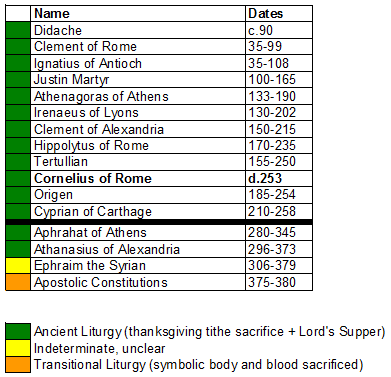The original liturgy:

The Roman liturgy:

Cornelius of Rome (250)
The writing that we will examine from Cornelius of Rome comes to us from the historian Eusebius:
There have reached us epistles of Cornelius, bishop of Rome, to Fabius, of the church at Antioch, which show what was done at the synod at Rome, and what seemed best to all those in Italy and Africa and the regions thereabout. Also other epistles, written in the Latin language, of Cyprian and those with him in Africa, which show that they agreed as to the necessity of succoring those who had been tempted, and of cutting off from the Catholic Church the leader of the heresy and all that joined with him.
Another epistle of Cornelius, concerning the resolutions of the synod, is attached to these; and yet others, on the conduct of Novatus, from which it is proper for us to make selections, that any one who sees this work may know about him.
Cornelius informs Fabius what sort of a man Novatus was, in the following words:
…
He adds to these yet another, the worst of all the man’s offenses, as follows:
For when he has made the offerings, and distributed a part to each man, as he gives it he compels the wretched man to swear in place of the blessing. Holding his hands in both of his own, he will not release him until he has sworn in this manner (for I will give his own words):
And the unhappy man does not taste until he has called down imprecations on himself; and instead of saying Amen, as he takes the bread, he says, I will never return to Cornelius. Farther on he says again:
Citation: Eusebius. “Church History.” Book 6. §43 ¶3-5,18-20
Cornelius complains about two things that Novatus did to corrupt the ancient liturgy.
First, he corrupted (4) the consecration (or epiclesis) by replacing the blessing with an oath to be sworn.
Second, he corrupted the oblation by skipping the (3) corporately spoken Amen and going straight to taking the bread.
Most notably, Cornelius reports the same order of the liturgy as the other ancient witnesses that we’ve examined throughout this series. In particular, the (3) Amen precedes the (4) consecration. Throughout this series we’ve mentioned the “Amen” that separates the (1-3) sacrifice of the eucharist from the (4-5) celebration of the Lord’s Supper, but here we are just over 200 years after Christ’s ascension and the “Amen” is still present and still precedes the Consecration. As we’ve found before, the Roman liturgy is nowhere to be found.

